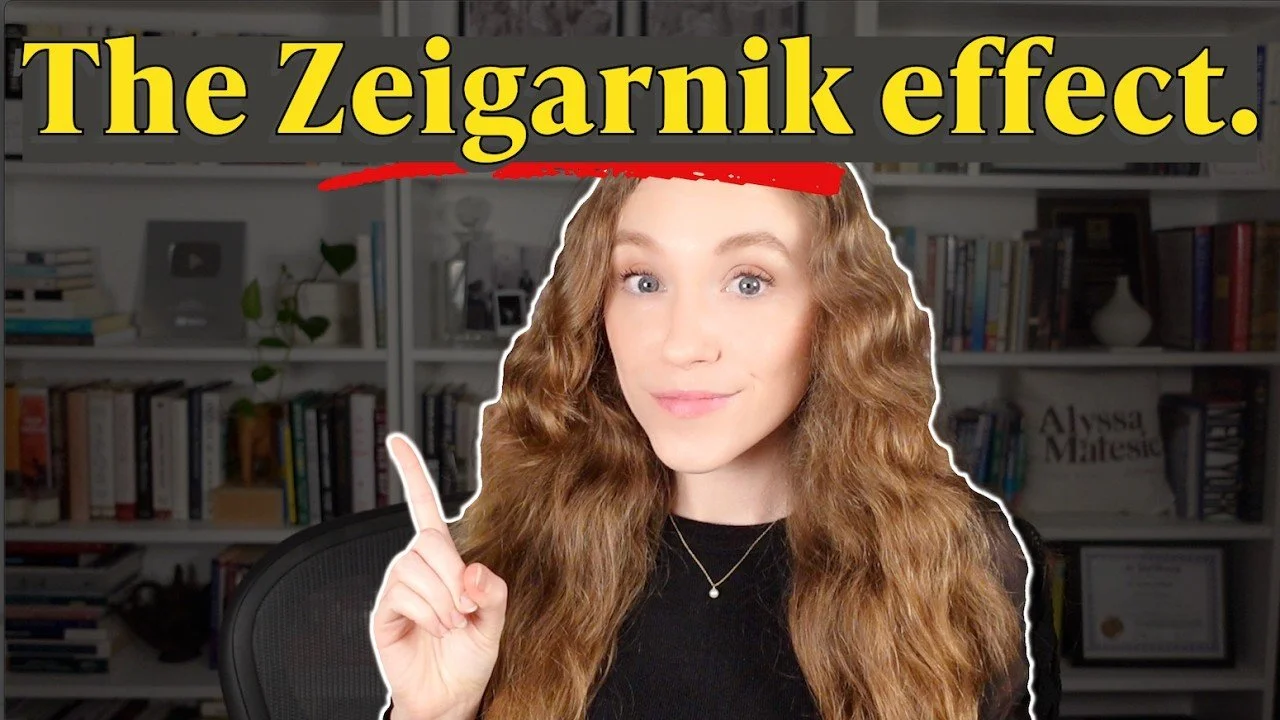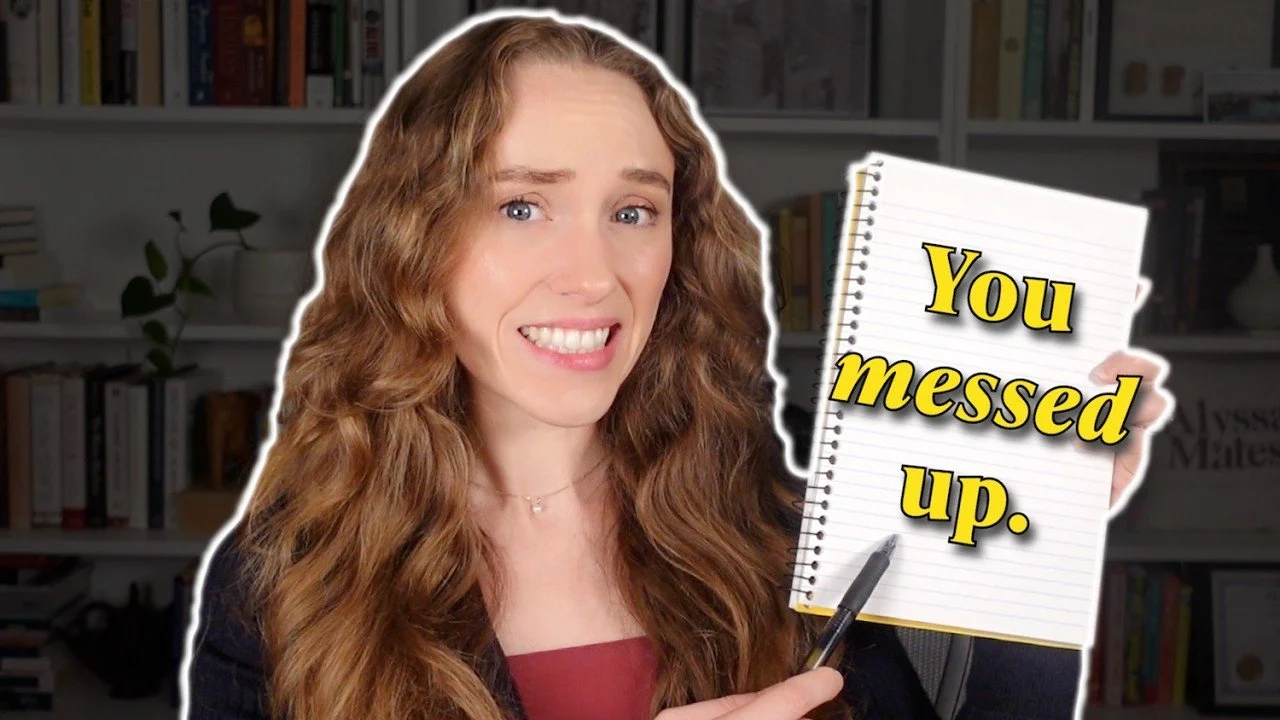Grammar Rules for Novel Writing Beginners (With Examples!)
HIT PLAY OR READ THE POST BELOW:
One of the most beautiful things about the craft of writing is that it is a skill you can always improve. It's important to continue sharpening your writing skills so that you are consistently able to write strong characters, scenes, and lines of dialogue.
It’s easy to think that the longer you’ve been writing, the better your skills automatically are. However, in this article I’m going to go through five sentence-level writing mistakes I commonly see in my clients’ manuscripts, plus examples on how to fix them. These book writing tips for beginners can apply across genres but are mostly geared toward writers who are working on fiction projects.
Since these are sentence-level mistakes that get into the technicalities of your prose, both new and seasoned writers can make these mistakes, especially if you’re not used to looking out for them. Wherever you are in your writing career, I recommend checking these mistakes out to see if you can find any in your manuscript. No matter how strong your writing skills are, it is possible to slip up when it comes to the fine details.
Redundant Phrasing
The first writing mistake is redundant phrasing, which is when your sentence includes extraneous words or phrases that are already implied by other words in the sentence. As a result, your sentence becomes clunky and bulky.
This may not seem like a big issue on a single sentence basis, but when a chapter contains many sentences full of redundant phrasing, it can get tiring to read.
This issue has a simple fix of just simplifying your sentences, keeping your prose clear and smooth. The same meaning will still be conveyed without the extra bulk.
Let's go through one quick example:
Above, the stars were visible in the dark, pitch black sky.
In this sentence, “dark” and “pitch black” convey the same thing, so you don't need both of those descriptors here. Additionally, the fact that the stars are visible also already informs the reader that it’s pretty dark out.
Here’s a revision:
Above, the stars were visible in the night sky.
“Night sky” conveys the time of day, while indicating the dark color of the sky.
Redundant phrasing is one of those writing mistakes that even the most seasoned of writers can fall into. Plus, we use redundant phrasing verbally all the time, but it’s not as obvious compared to when it’s on the page. Being able to recognize when your sentences are redundant will streamline the editing process.
Heavy-Handed Foreshadowing
The second book writing tip for beginners is to avoid heavy-handed foreshadowing. As the author, you have a full picture into how the nuances of your story play out from start to finish. Your goal is to deliver that story effectively to readers, and sometimes that delivery requires some suspense.
Foreshadowing is a great technique to develop suspense, but it's easy to lean into heavy-handed language in an attempt to build the reader's anticipation. This language often comes at the end of a scene or chapter, and if it keeps happening scene after scene or chapter after chapter, these bits of foreshadowing can come across as dramatic or even melodramatic. It’s like the narrator is winking or nudging at the reader continuously.
For the most part, if the plot development or twist is going to occur in a subsequent scene, I don’t find it necessary to include this type of foreshadowing. I prefer to experience the shock and surprise of the development as it happens on the page.
Here is an example:
Brittany went to bed that night in blissful ignorance. Little did she know that tomorrow she would receive news that would change her life forever.
The second sentence is literally telling the reader that something is going to happen to Brittany, almost taking away from the shock of the next scene. Instead, I recommend omitting the sentence entirely to strengthen this section, so that the reader can experience what happens as it happens.
Here’s the revision:
Brittany was blissful when she went to bed that night.
Here, the fact that you are calling attention to Brittany being “blissful” gives the reader an inkling of suspicion that something is going to go wrong, especially if it seems at odds with what happened previously. This is a subtler approach rather than the heavy-handed foreshadowing that tells the reader exactly what to expect in the next scene.
Subject-Verb Disagreement
The next grammar rule for novel writing beginners is subject and verb agreement. Subject-verb agreement is one of the basic principles of English grammar, but when you write stylized fiction and have complex sentence structures, it can be quite easy to mix up your subject-verb agreement.
You want to make sure that your verb structures relate back to the subject of the sentence. If it’s unclear which subject the verb is applied to, it will be difficult for the reader to interpret what you are trying to convey.
This issue most often occurs when you are using a gerund as an adjective phrase modifying the subject at the start of a sentence. If you, like me, have forgotten all about sentence components since middle grade English, let me just show you an example.
Sweating profusely, the run home took longer than Mark anticipated.
Can you see what's wrong with this sentence? Technically the subject of the sentence is “the run,” therefore the phrase “sweating profusely” should apply to “the run.” However, we know that a run cannot sweat, so even though a reader is still able to understand the meaning of this sentence, which is that Mark is sweating profusely, you still want to make sure your sentence is clear and grammatically correct.
You could rephrase the sentence to something like this:
Sweating profusely, Mark ran home, the journey taking longer than anticipated.
Now Mark is directly related to the phrase “sweating profusely.”
While this mistake might not seem important, as readers can still understand what is being said in the sentence, those readers who do have a grammatically trained eye will notice. If it comes up in your novel over and over, it can make an otherwise polished novel seem amateurish.
Incorrect Flashback Tense
If you are writing fiction, lots of times you will incorporate flashbacks to talk about a memory or a past event that is relevant in the primary narrative. However, keep in mind that the flashback must be differentiated from the primary narrative or it will be difficult for the reader to tell what is going on in the past vs. the present, especially if you flesh out the flashback as a full scene.
If you are writing your story in the past tense, which is the most common tense to write a fiction story in, then your flashbacks need to be written in the past perfect tense. The past perfect tense is the tense where you have “had” before the verb phrase. This will indicate that everything in the past perfect tense belongs in the flashback vs. the ongoing narrative in the regular past tense.
This will become much clearer with the example.
Mary thought about the night she first met Jacob. They were at prom dancing with their dates. She caught his eye across the room and smiled. Turning away from his date, he walked over to Mary.
Every sentence in this passage is written in the simple past tense, which technically means this is all happening in the primary, ongoing narrative. It’s hard to tell, grammatically, when the narrative moves into the flashback.
Here is a revision:
Mary thought about the night she first met Jacob. They had been at prom dancing with their dates. She had caught his eye across the room and smiled. Turning away from his date, he'd walked over to Mary.
All of the verb phrases that belong to the flashback now are in past perfect tense, making it easy to tell what happened in the distant past vs. what is happening in the present narrative.
The Undefined “It”
Defining “it” is another classic grammar rule for novel writing beginners. A sentence with “it” as one of the subjects can be perfectly grammatically correct and it's not necessarily going to set off any of your writing software flags or warnings. But make sure that any time you are writing a sentence that contains “it,” it is very clear what “it” is referring back to. Otherwise, the meaning of the sentence is going to quickly get muddled.
Let's look at an example of an undefined “it.”
Claire was worried about her test results, yet excited about going on the date with Josh. It made her toss and turn as she tried to sleep.
Can you identify what that “it” is referring to? The sentence is not clear. She could be tossing and turning in worry about her test, or tossing and turning with excitement about her date. It could be both things, even. The reader just doesn’t know
Here’s a revised version that clarifies the meaning.
Claire was worried about her test results, yet excited about going on the date with Josh. The anxious mix of emotions made her toss and turn as she tried to sleep.
Here we see that it is the mix of emotions causing her sleep issues.
By keeping your “its” defined, your prose will be clear. This also helps you build authority as a storyteller, as the reader can trust that you can seamlessly convey what is going on in the scenes of your book.
I hope these grammar rules for novel writing help you craft stronger, more streamlined, and more deliberate sentences that build up to an effective story. After all, every story is a collection of scenes made of a collection of sentences! So you want to make sure that each and every sentence is as clear as possible.
Thanks so much for reading and happy writing!





